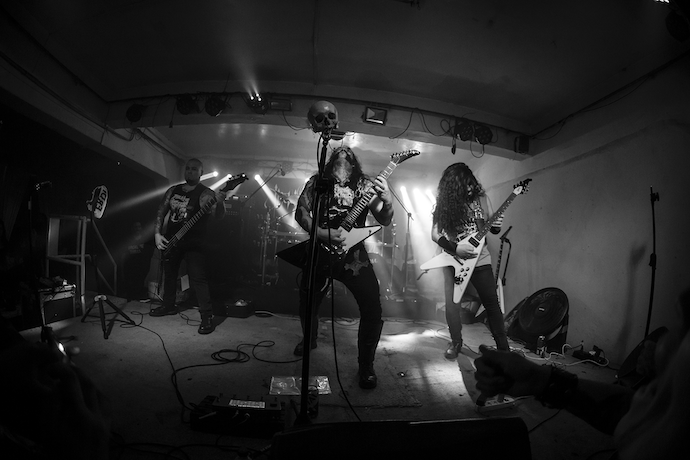
(Anyone who has followed Comrade Aleks lo these many years knows that if any metal band is inspired by the works of HP Lovecraft he will eventually talk with them. As he did with Joseph Curwen from the Chilean death metal band Unaussprechlichen Kulten, and a good conversation it was.)
Chilean death metal band Unaussprechlichen Kulten was named after the fictional occult grimoire invented by H.P Lovecraft and R. E. Howard. And, according to its name, the band have continued to channel the will of ancient malign entities through their ferocious and macabre songs since 1999.
Their six album Häxan Sabaoth was released by Iron Bonehead Productions on the 2nd of February, and we made this interview with Unaussprechlichen Kulten founder Joseph Curwen (vocals, guitars) in the lead-up to its release. And, in my opinion, we had a pretty smart, even witty conversation thanks to Joseph.
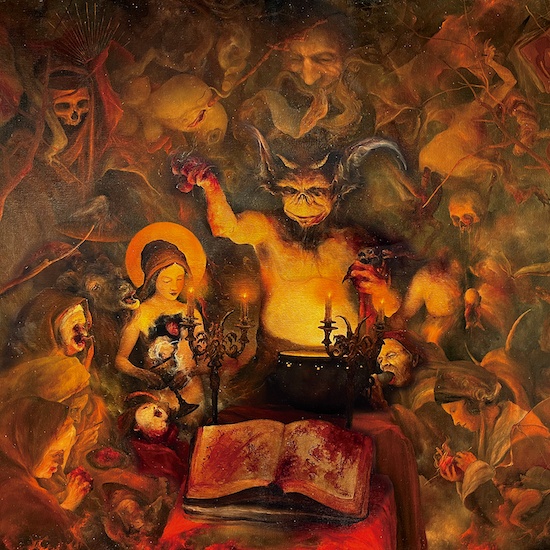
Hail Joseph! How are you? What’s going on in your camp now that the album Häxan Sabaoth is in your hands?
Rehearsing hard! Our first show in 2024 is now in February in Mexico. We hope to promote Häxan Sabaoth by playing it a lot, in many places.
This year the band will celebrate its 25th anniversary. Are you satisfied with the way you work? Do you feel that you used all the opportunities that destiny has offered you?
The truth is that we are not worried about “birthdays or anniversaries” of the band or albums. Satisfied? No of course not; being satisfied is synonymous with conformity and mediocrity; we have enough energy for at least 10 more years. I think that as long as we are dissatisfied, we will remain alert and dignified.
Regarding opportunities, there are few that we third world bands receive, so we remain attentive to take advantage of them, so every time you see a presentation of us or listen to an album, you will be in front of the best that our limited capabilities allow us.
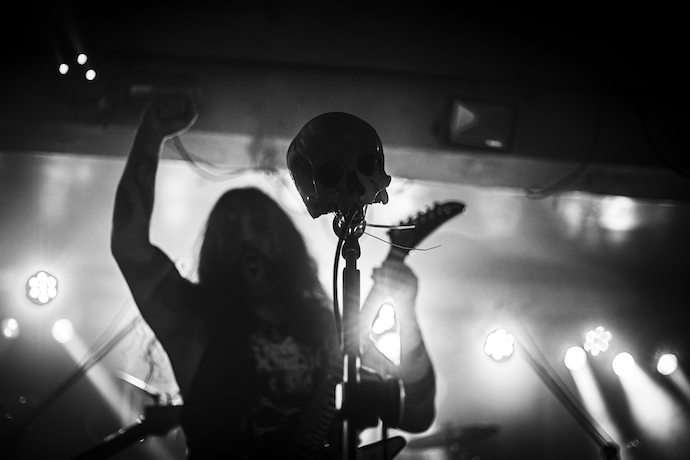
Do you plan to celebrate the anniversary and the album’s release with a tour or series of shows? How often do you usually play live?
We don’t play live much, maybe a handful of times a year, but that’s because it’s very expensive for agencies or festivals to pay for our tickets from the ass end of the world. Our logistics (like all South Americans) are expensive, and as we are not Slayer, we can’t assure anyone of their investment. Anyway, we won’t spend our lives complaining. In many occasions we organize everything ourselves, and of course this time won’t be different — we are already organized and have scheduled some dates. If there is any promoter reading this and is interested in having us in their country, please contact us.
What’s the furthest point on the map where you played live? How much easier is it to organize gigs in Chile or neighbouring countries?
In 2014 we were lucky enough to get to Umea (Sweden) and play there. It was a very rare date, and that same day we were informed from Chile of the death of our drummer’s father.
Regarding the shows in Chile, in Santiago it is very simple, so simple that in the same weekend you can have three or more underground shows. That makes it complicated, because the audience is the same and you have to divide it. But leaving Santiago makes things even more complicated. The distances for a long time meant that the local scenes in Chile were condemned to the cloister of their own region. If you consider that nowadays underground metal is not as popular as it used to be, it makes everything more difficult. However, even though the distances in South America are very big (unlike Europe), we have been able to play in Brazil and Peru.
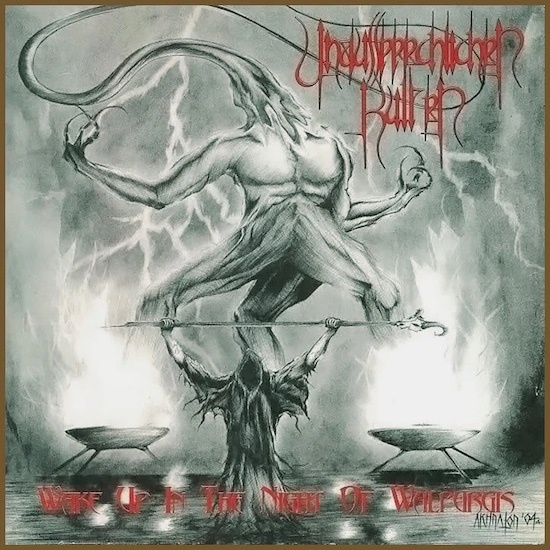
Unaussprechlichen Kulten’s first album Wake Up in the Night of Walpurgis was released almost a decade ago. How far did you go from this point with Häxan Sabaoth? How much of that original attitude and the concept are left in your music?
They are VERY different. On Wake Up in the Night of Walpurgis you can feel the anxiety we had, a thousand tempo and rhythm changes per minute, lots of riffs, it’s a very schizophrenic album. Now instead, there is no rush in the composition, and every part of every song is intentionally inspired to transmit something specific. The same thing happens at the production level. In the beginning the result was somewhat uncertain, we just went and recorded with the technical equipment that was available and hoped that it would turn out the best way, but now we take more time choosing sounds and designing the specific atmospheres we want.
Do you now have enough equipment to meet your goals regarding the sound, or do you work with well-equipped studios?
Luckily for us, in the last 15 years things have changed for the better in Chile. There are many well-equipped studios and good professionals, even metal specialists! But not only studios, we have a variety of backline and sound reinforcement companies. Now, even if we live in the ass of the world we can import or bring the guitar or amp we want, we no longer have the excuse that our predecessors had, and we can no longer blame the lack of equipment; the one that sounds bad now is simply because of mediocrity.
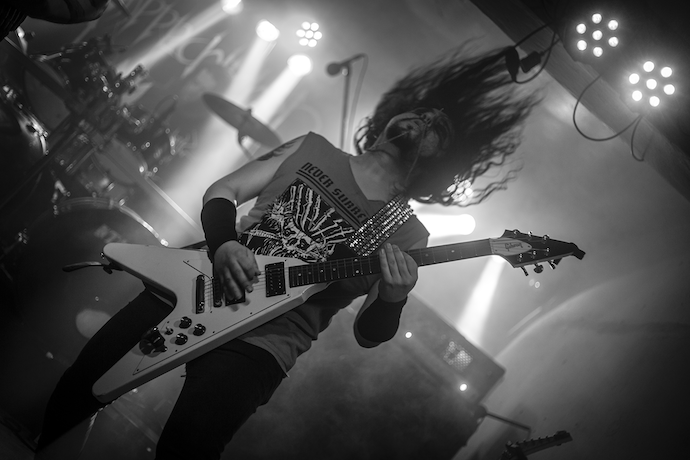
The previous album Teufelsbücher was released at the beginning of the pandemic. Did this situation back then influence the process of creating the new material?
The truth is that the pandemic delayed the release of Häxan-Sabaoth A LOT. The sanitary regulations in Chile were exaggeratedly unnecessary, and all the mask-loving sheep were happy to be locked up in their burrows. That stopped the country and directly affected our possibility of getting together. We play Death Metal in the old-fashioned way: lots of rehearsal room bustle, acoustic drums, amps, screaming and growling, the stinking smell of sweat and exhaustion… all that modern hipster bullshit of being an online lab band, in the safety of home and with lots of colorful buttons to push, is not for us.
Does it mean that you already have some new material prepared?
Yezzz! There is already something in the cauldron with bat wings and human bones cooking, but the work has to be done by us, the Devil is not going to show up in the rehearsal room to play the instruments. The process is long but we already have some riffs and some structures composed. You know we are quite time-limited, the metal underground doesn’t pay the bills, so everything we do is after our “normal jobs”.
In which conditions did you record Häxan Sabaoth? Did you meet any obstacles during the session?
This album was different in its production than the previous ones. Besides that, we changed our lineup (Atomizer Pig is back on bass!) and we took much more time; it was in several sessions (the whole recording took about a month). We used the recording studios where I was studying (without permission!), much of the material we recorded as a “sample” or “soundcheck” was eventually deemed decent, and we selected it as available tracks for the final mix. The mixing and mastering was done by myself. I was consulting with the band in all the processes, so the work was collaborative and everyone participated.
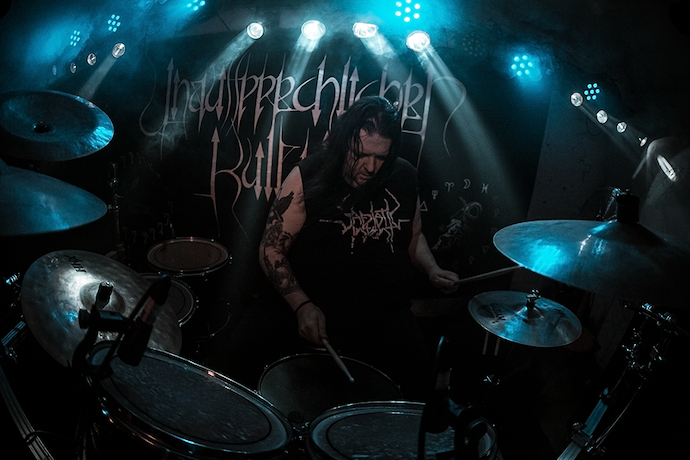
The band’s name itself is tightly connected with Lovecraftian mythology; does it remain a cornerstone of Häxan Sabaoth alongside Satanic influences?
Thematically speaking, we still remain firm to the same premise: our free interpretation, of HPL’s work, mixed with traditional demonology, universal mythology, and even Chilean legends. We spent a lot of time putting explanatory texts in the inserts, talking about that. I think one of the great values that the physical format (vinyl or CD) has is that you can sit in front of your stereo with the lyrics, and in this case read the extensive liner notes we put in (as in all our chapters). That is an experience you don’t have on digital platforms.
Why did you choose to give your interpretation to HPL’s stories instead of following their plots word by word? Do you have songs totally based on his stories?
It has been a process. For example in Wake Up in the Night of Walpurgis everything was created word by word, and each theme directly represents a particular story. However, later I found that it was necessary to give some “added value” and not just abuse HPL and that’s how for example in Teufelsbücher there is a song called “The Evil out of Control”. The lyrics of this song talk about curiosity, and the danger to which one is exposed who delves into Necromancy, Even Spiritism, just as it happened to Lovecraft’s character (Charles Dexter Ward).
This can be recognized even by a famous current exorcist: “When one calls a soul in a spiritualist session, in reality, a demon can come. A demon that can possess the one who invokes him or that can deceive him by talking to the one who does spiritualism” (“Exorcística” J.A. Fortea). It is a universal message, as the lyrics of Mercyful Fate in “A Dangerous Meeting” say: “Not to play with the powers of Hell”.
Another example is “Lamia Sucuba” in Häxan-Sabaoth that talks about the archetype of the witch, mixing the Chilean legend of “la Voladora”, the witch Keziah from HPL’s “The Dreams in the Witch-House”, and all the classic iconography of flying women.
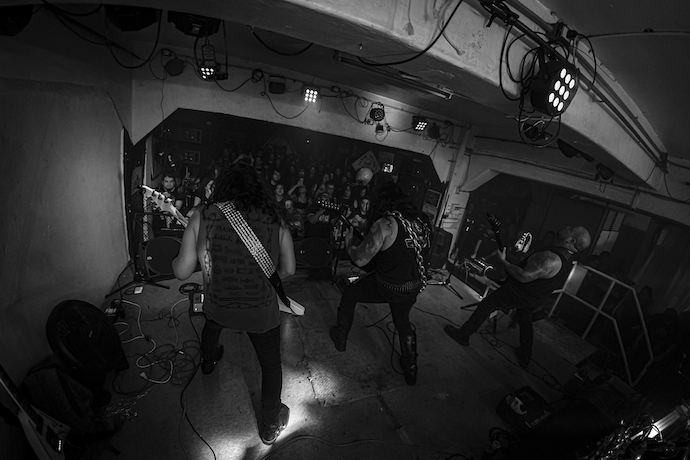
What was your first encounter with the world of H. P. Lovecraft and satanism? Why did you choose both aspects to build the band’s concept on it?
I discovered HPL accidentally. When I was a kid (10 years old approx.), I bought a pirate bootleg issue book, which was sold in a “craft fair” (typical informal trade in Chile, something like a “garage sale”). I remember that one of the stories in that book was “Through the gates of the silver key” and it blew my mind! It didn’t take me long to get all the HPL material in Spanish that I could. I read some stories so many times that I memorized them… and here comes the second part of what you ask about “Satanism”:
With time I was looking for his “sources”, in the traditional demonology. When I read “The Case of Charles Dexter Ward” I was of course fascinated by the character of JOSEPH CURWEN. That little novel is for me the most important work of HPL; it is almost a “confession” of his knowledge and the information he had access to (was “revealed” to him) … just to say something … there appear two invocations that are real, coming from The Mysteries of Magic by Eliphas Levi (for those who want to investigate more I recommend a book called The Necronomicon Files: The Truth Behind the Legend). Of course, later for me, everything aligned with the vision given by Kenneth Grant in his The Magical Revival.
There are a lot bands who base their lyrics on Lovecraftian horror, and these bands perform their stuff in the vein of heavy, prog, doom, black, and death metal too. Which qualities of death metal benefit this concept? What help to highlight this specific atmosphere?
I chatted with HPL via the OUIJA board and he told me that he is so ashamed of how they had used his concepts in so many mediocre and boring bands, that he was preparing his revenge and would raze the crappy movies inspired by his work as well. HAHAHAHAHAHAHAHA . I think the answer is simple: it’s still a challenge to try to bring the atmosphere of HPL’s lyrics to music, whatever the genre.
So you combine elements of Lovecraftian horror with the attributes of the main antagonist in monotheistic religions. What do these elements or figures personify for you?
By definition: Anything that is glorious will always have the attributes of the main antagonist of the monotheistic religions. Regarding the “Abrahamic” religions, I believe that we should not give them so much importance; they no longer have any political or social weight in the world (it’s only money), and it is not necessary to spend time on them.
As for the rest, neither Abraham nor Moses really lived, neither David nor Solomon were kings, there was never a captivity in Egypt, much less a crossing of the Red Sea, nor a collapse of the walls of Jericho, Noah never existed. The whole Bible is a forgery, an adaptation of older stories/mythology and of different peoples. The evangelists invented all that “story” and that “TVseries” to overthrow the Egyptian, Persian, and Roman empires, to impose their minority.
The Genesis was not born in Palestine, its origin may be in Mesopotamia (now Iraq) probably plagiarized from the Gilgamesh. Jesus never existed, neither Mary nor Joseph existed, everything is falsification and story. The gospels have mixed two different persons that existed in those times and mixed them in only one “messiah”. A first person would be “Jesus”, the nationalist zealot, who did not conceive another humanity wider than his sect and his own interests; the second person could be an Essene master, similar to the yogas of India, to the vedantine philosophers, the one who says “let the children come to me”. For any psychologist who reads the New Testament it is obvious that these two characters are totally different.
A “pragmatic” answer of why to use HPL, is because to explain mystical/religious concepts or ideas we should use common and Judeo-Christian terms and words to be understood: Demons, God, Soul, Spirit, Gods, Angels, Resurrection, etc., and then we turn to Lovecraft, who in a masterful way can dispense with all that terminology and with his own worldview explain the same “dark side of life” with his own terms. Good idea, isn’t it, a vocabulary much more “according”, deep and adequate for us.
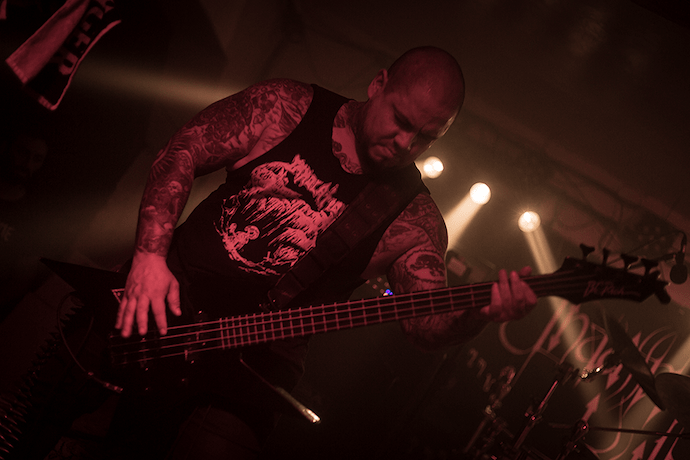
How do you see your mission behind Unaussprechlichen Kulten? Is it about death metal for death metal’s sake, or do you put a message in your albums?
Our mission in U.Kulten. is to conquer the world, destroy it. and deliver it as an offering to Cthulhu… HAHAHAHAHAHAHAH. Nah… we are neither philanthropists nor altruists; we don’t pretend to change the world, nor to improve the scene, nor to give people advice. All the message we want to share are written in the lyrics of each album, many times with a detailed context of quotes and references. It is not necessary for me to appear in this interview as a pretentious occultist trying to be mysterious: “He who has eyes let him see”.
What are your further plans for 2024? Do you have any songs left from this recording session that you can use in other releases?
We hope to be able to promote our new album in the first world. Regarding new songs: we are playing a cover song of Shub Niggurath (Zatanazombie), and I hope we can record it this year. There are also several commitments (Splits) that we hope to be able to fulfill with everything.
Okay, thank you for the interview, it was both interesting and entertaining. A perfect balance. Do you have a few more words for our readers?
You took a lot of time to write personalized questions — we appreciate that and the people who took the time to read this interview. Iä! Shub-Niggurath! The Black Goat of the Woods with a Thousand Young!
https://www.facebook.com/pages/Unaussprechlichen-Kulten/609345889079874

This was an awesome interview for an awesome band. From one dude in NY to a bunch of maniacs in Chile, thanks for the things you do. And thanks to Aleks for a proper good set of questions!
Haxan Sabaoth is a monster and wonderful continuation of the UK brand of True HPL Insanity.
No band does it quite like them.